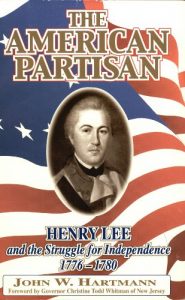Henry Lee was one of the greatest front line soldiers ever to wear an American uniform. The role he played in the Revolutionary War rivals the heroics of Joshua Chamberlin and Nathan Bedford Forest during the Civil War, and Alvin C. York and Audie Murphy during the World Wars.
The American Partisan tells the story of Lee's career as a soldier in the Revolutionary War from 1776 to the autumn of 1780. During this four-year period, Lee fought almost exclusively north of the Mason-Dixon line, primarily in the states of Pennsylvania, New York, and New Jersey.
Mr. Hartmann develops an essential point about Lee's character: his ability ot charm and impress his superiors, especially Washington. "Indeed," asserts Mr. Hartmann, "Lee benefited from a double standard that gilded his career." Of particular note is Washington's curious indulgence of Lee's occasional mistakes. For example, when Lee was responsible for the loss of a critical piece of artillery, Washington casually dismissed the issue as "only the loss of an Iron piece."
Mr. Hartmann's insightful portrait of the interesting relationship between Lee and Washington enriches our understanding of Washington as we mark the 200th anniversary of his death this year. Henry Lee owed much to George Washington, and at Washington's death it was Lee who eulogized our first President with the immortal words:
First in war,
First in peace,
First in the hearts of his countrymen.
Christine Todd Whitman
The American Partisan tells the story of Lee's career as a soldier in the Revolutionary War from 1776 to the autumn of 1780. During this four-year period, Lee fought almost exclusively north of the Mason-Dixon line, primarily in the states of Pennsylvania, New York, and New Jersey.
Mr. Hartmann develops an essential point about Lee's character: his ability ot charm and impress his superiors, especially Washington. "Indeed," asserts Mr. Hartmann, "Lee benefited from a double standard that gilded his career." Of particular note is Washington's curious indulgence of Lee's occasional mistakes. For example, when Lee was responsible for the loss of a critical piece of artillery, Washington casually dismissed the issue as "only the loss of an Iron piece."
Mr. Hartmann's insightful portrait of the interesting relationship between Lee and Washington enriches our understanding of Washington as we mark the 200th anniversary of his death this year. Henry Lee owed much to George Washington, and at Washington's death it was Lee who eulogized our first President with the immortal words:
First in war,
First in peace,
First in the hearts of his countrymen.
Christine Todd Whitman






